No more jostling forklifts in the warehouse. When you no longer have to consider this, you are getting close to what Deprez Handling Solutions has in mind when it offers automation solutions to customers in the potato, onion, and carrot sectors. "We never simply propose a single solution; we offer a total solution," says business manager Johan Deprez.
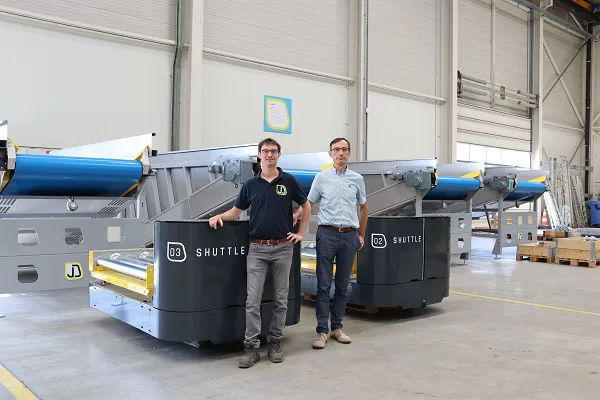
Internal logistics and storage are what this Dutch company specializes in. "We design and build a lot of techniques and machines ourselves, but when we see an existing solution on the market for a certain task that perfectly meets our client's needs, we don't go and reinvent the wheel. We'll implement a third-party machine in the total package we propose to our customer. Together, we then consider which supplier's machine best meets the client's requirements. For example, many excellent scrubbers are already available for the potato sector, our largest customer. We're not going to copy them. We only design a machine ourselves if we think we can create added value," explains Johan
Crate logistics Maestro
"So, our trademark is, by no means, developing individual machines," adds his son, Jeroen. "Even though, years ago, we built the Maestro, a very high-performance crate logistics machine. This mobile machine receives a stack of empty crates, unstacks them, fills them non-stop, at 100 to 150 T/h, and stacks the full crates neatly two or three high. Our main focus is to offer a total solution, although it's very possible that this isn't how the sector immediately sees us."

Strategic, visionary choice
"Perhaps we're not well-known enough yet," admits Johan. "That's undoubtedly directly because of our nature of only getting involved when we're allowed to help conceive and paint the full picture. We focus on large customers who make strategic, visionary growth choices. They want to increase their internal efficiency with a system that seamlessly connects all operations, is fully automated, achieves high throughput, and minimizes product damage. It must use hardly any forklifts and few personnel. We want to unburden large potato processors, so they can concentrate fully on grubbing potatoes 24/7, using two or even three four-row harvesters at a time. The future belongs to the large cultivation companies, and processors must follow that scale increase. And what offers peace of mind? Automation; nothing else."
Active in three sectors
Deprez Handling Solutions provides solutions that meet the current staff shortage demand. Most of its customers are in the food sector, and are mainly potato, onion, and carrot processors. "But we're active in the bulk goods sector too. We, for instance, build systems for loading and unloading sand and gravel transport ships. And in the recycling sector, we design solutions for processing things like construction and demolition debris, container waste, wood, paper, and cardboard. This broad field of activity gives us the expertise and knowledge we need and use across the various sectors," Johan continues.
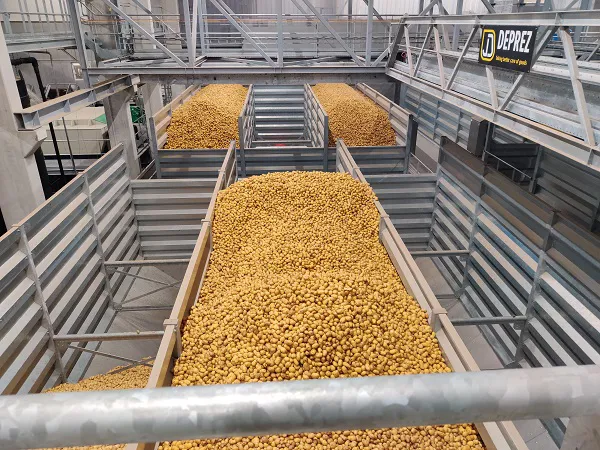
Robust systems for high flows
Johan cites a growing potato processing company as an example. For its new internal logistics system, it wanted not only high quality but a flow rate of 2x120 tons/hour too. "Each machine for each different task, each conveyor system, and the solution, as a whole, had to be robust enough to handle such a flow rate. That's where we're strong: we have bulk sector experience, where we build systems that unload ships at 800 tons per hour, and from the recycling sector, where we break concrete at 300 tons per hour or where effective scrapers are used to keep the conveyor belts clean and straight, so it can keep working 24/7."
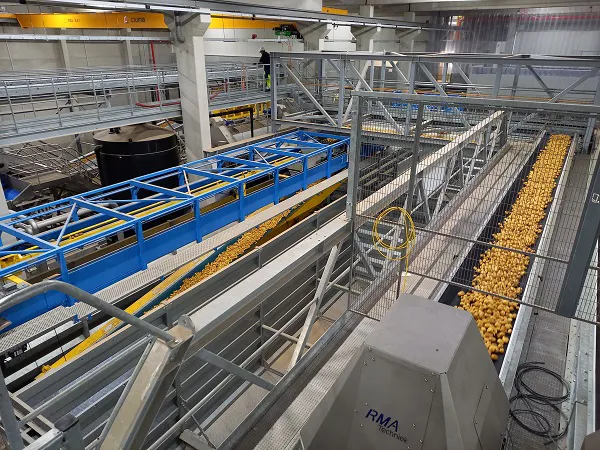
So, Johan and Jeroen are not intimidated, even when a processor wants a fully automated solution to unload and process 2x150 tons of potatoes/hr. They will always succeed, provided there is a good engine, rock-solid material, and the correct calculations are done, they say. "We're happy to take on such a challenge. Does careful handling of the potatoes suffer? Not at all. Forty years ago, I was already experimenting with a potato fall breaker on my folks' farm. Plus, we have in-house know-how and pay plenty of attention to that," says Johan.
Even greater efficiency possible
In Benelux, Deprez Handling Solutions does not have as big a market for total solutions as it would like. Nonetheless, Johan sees plenty of opportunities. "Our target group for large projects is rather limited. The more automation there is, the larger the sizable processors' market share grows, and the smaller that market will ultimately become. French fries companies and frozen products processors are still on the rise. Yet, not everyone completes a completely new project in one go. Phased construction with a clear end goal is, at least, as good an approach, keeping the investment manageable. Almost every company active in the fresh produce market still has room to improve efficiency. These days, retailers require complete traceability; something only automation, not four or five additional employees, can guarantee."
European and overseas clients
And should the Belgian and Dutch markets become saturated, there is always the international one. Deprez is not only present in France, Germany, England, and Spain, but also overseas, in Australia, the U.S.. and Canada. "We're currently busy with a huge project in Edmonton, Canada. It's the first project that our employees and local technicians will deliver. We could have used only our people. But because we're expecting more and more projects overseas in the future and will, therefore, no longer be able to handle everything in-house, we wanted to see how cooperating with local partners would work," Johan explains.
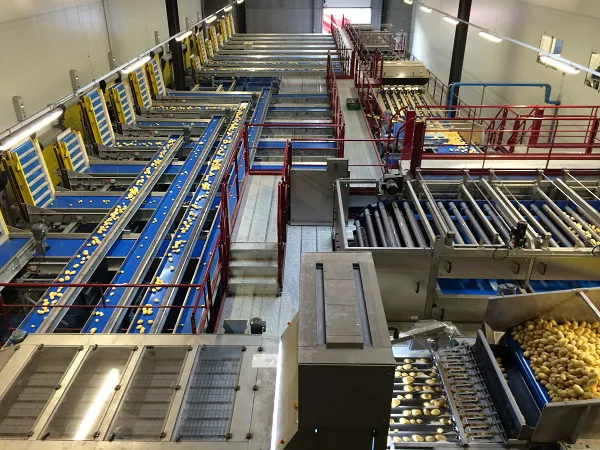
The American market is wide open
According to Jeroen, who will soon be traveling to Canada, Western European food processing companies are light years ahead of North America regarding automation and process insight. "Some companies there still use as many as 50 forklifts and have 100 people on the conveyor belt line. The various machines are all of sound Dutch manufacture, but a total concept that should enable automation and full efficiency is missing. Americans see everything in grand terms and have plenty of space, which isn't an issue for them. They'll put up a warehouse 200 meters from another part of the factory. All very inefficient, of course, because the more space you use, the more movements you have to make. So, the advantage is that, in the U.S., massive leaps can still be made in this area. And that's the market we're now entering."
Potato sorting and packaging line with only one operator
Johan mentions a Belgian potato sorter that processes 40.000 tons annually with 25 people. "We delivered a line at a different, slightly smaller company that also washes and sorts potatoes. They only employ one person - admittedly, something I didn't expect - to operate the line. You don't need anyone, at all, to intervene, and the company relies completely on the system. They put all the management software that comes with such equipment to good use. All movements, volumes, and performance can be perfectly controlled and seen on a screen."
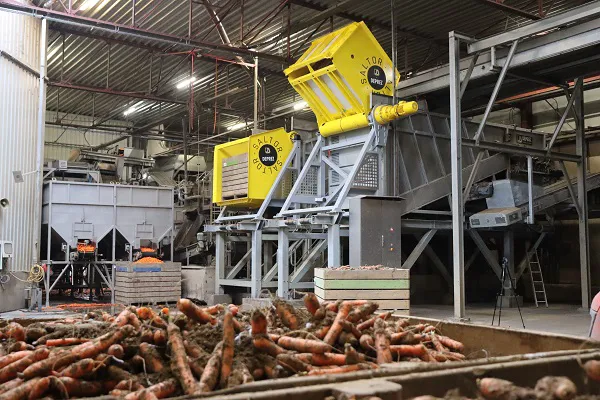
Thinking ahead
And if you want to be more efficient, forklifts are not the way to go when it comes to large volumes, says Jeroen. "You have to aim for as compact a system as possible and remove all dead times from the process because they add zero value. And you must always think three steps ahead. Why is there still so much potato waste being used as animal feed? While many residual streams are perfect for making mashed potatoes or flakes. We like to brainstorm with our clients and find solutions. One customer, for example, extracts starch from wastewater. A fine example of sustainability, I'd say."
Optical onion sorting line
Deprez Handling Solutions is not the cheapest on the market. "Inferior quality keeps causing headaches long after the pleasure of a low price has evaporated. You have to spend a substantial amount on automation, especially if you want to go 'all the way'. It's always a strategic choice by a visionary company. A quick return on investment isn't always obvious and is often difficult to calculate. Working with staff and forklifts may be cheaper now, but certainly not in the long run," says Johan.
"Those who take the leap now will have a huge head start later. For instance, not so long ago, we provided a box handling system for a Dutch company's optical onion sorting line. It sorts and packs huge volumes with only seven employees. Size and quality sorting are done non-stop and damage-free, with all performance data available in real time. And no one sits there with a pinhead. Everything runs smoothly and according to plan. That's the future, and we're pleased to be involved."
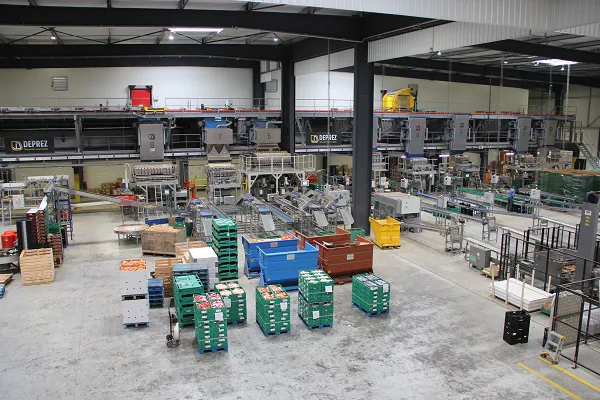
In conclusion, Jeroen highlights a second focal point besides Deprez Handling Solutions' strength in provisioning total solutions. "Our projects are always delivered on time and on schedule. These days, everything has to move fast, especially in the French fries industry. If a warehouse is built today, the machine has to be installed tomorrow so the company can be up and running the next day."
"To meet those demands, you need structure, body, and highly competent people. We have the personnel, IT, machines, trucks, and cranes," he explains. Johan compares it to cycling, a popular regional sport. "We're just like a top cyclist, who can change gears quickly, sprint where necessary, and add that extra power when the finish line's in sight. Deprez is certainly not the cheapest, but our clients receive the best solution. The most efficient solutions pay for themselves," he concludes.
![]() Johan Deprez
Johan Deprez
Deprez Handling Solutions
Lichterveldestraat 129A
8610 Kortemark
+32(0)51 5814 91
[email protected]
www.deprez.be
